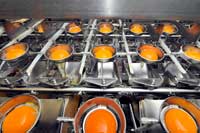German dioxin contamination hits UK

It has been confirmed that eggs from German poultry farms affected by dioxin contamination in feed have entered the UK’s food chain after being exported in liquid form and used in preparing processed foods such as cakes and quiches.
The FSA has confirmed Kensey Foods, Cornwall, a division of Samworth Brothers, and Memory Lane Cakes Ltd, Cardiff, a division of Finsbury Food Group, were both supplied with contaminated liquid egg which was used to produce quiches and cakes.
The authority was quick to point out there is no risk to the public from eating these products and with most already passing their ‘best before’ dates supermarkets will only be removing small amounts still on shelves.
Also the FSA said the contaminated liquid egg used was made using a mix of contaminated and non-contaminated eggs, meaning dioxin doses were low and are not thought to be a problem for human health.
Studies on animals fed on diets high in dioxins have shown them, over the long term, to exhibit higher rates of cancers, damage to the immune, reproductive, hormonal and nervous system as well as liver damage and weight loss.
The contaminated eggs found their way into the UK via The Netherlands where 136,000 eggs from affected German farms were processed into pasteurised liquid egg and subsequently exported to the UK for use in food manufacture, EU authorities said.
In comments reported by the BBC, European Commission health spokesman Frederic Vincent has described how contaminated product reached Britain.
“Those eggs were…processed and then exported to the United Kingdom…as a 14-tonne consignment of pasteurised product for consumption,” he told reporters. “Whether it went into mayonnaise, pastries, I don’t know. So we will probably take a look at this with the UK authorities and see what was done with these eggs.”
The British Egg Industry Council has urged manufacturers, in light of the dioxin scare, to switch to using only British Lion Eggs in their processes.
“While there have been a number of instances of dioxin contamination in eggs and egg products across the EU over the past decade, the requirements of the Lion Code have meant that there have been no such cases in British Lion eggs or egg products,” said BEIC chairman Andrew Parker.
British Lion eggs are produced to a code of practice stipulating feed is sourced from companies producing according to the Universal Feed Assurance Scheme, which ensures raw materials are sourced from approved suppliers.
Currently about 4709 mostly pig farms in the north-western German state of Lower Saxony have been closed following the contamination, though poultry farms are also affected. Meanwhile, major importers of German pork, South Korea, has announced it will be halting all imports from the country while importer of poultry meat and eggs, Slovakia, announced it will halt imports.
